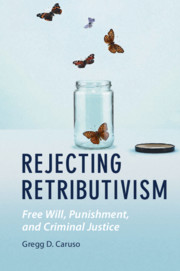Book contents
- Rejecting Retributivism
- Law and the Cognitive Sciences
- Rejecting Retributivism
- Copyright page
- Dedication
- Contents
- Acknowledgments
- 1 Free Will, Legal Punishment, and Retributivism
- 2 Free Will Skepticism
- 3 The Epistemic Argument against Retributivism
- 4 Additional Reasons for Rejecting Retributivism
- 5 Consequentialist, Educational, and Mixed Theories of Punishment
- 6 The Public Health–Quarantine Model I
- 7 The Public Health–Quarantine Model II
- 8 The Public Health–Quarantine Model III
- 9 The Public Health–Quarantine Model IV
- References
- Index
4 - Additional Reasons for Rejecting Retributivism
Published online by Cambridge University Press: 06 May 2021
- Rejecting Retributivism
- Law and the Cognitive Sciences
- Rejecting Retributivism
- Copyright page
- Dedication
- Contents
- Acknowledgments
- 1 Free Will, Legal Punishment, and Retributivism
- 2 Free Will Skepticism
- 3 The Epistemic Argument against Retributivism
- 4 Additional Reasons for Rejecting Retributivism
- 5 Consequentialist, Educational, and Mixed Theories of Punishment
- 6 The Public Health–Quarantine Model I
- 7 The Public Health–Quarantine Model II
- 8 The Public Health–Quarantine Model III
- 9 The Public Health–Quarantine Model IV
- References
- Index
Summary
We have now seen two distinct arguments against retributive legal punishment: (1) the Skeptical Argument and (2) the Epistemic Argument. In this chapter, I would like to consider additional reasons for rejecting retributivism that are independent of worries over free will and basic desert moral responsibility. I will argue that even if one does not share my skepticism about free will, there still remain good reasons for wanting to reject retributivism. This is because, even if we assume, for the sake of argument, that the requisite capacity for control is in place and agents are morally responsible in the basic desert sense, retributivism still faces a number of powerful philosophical and practical objections. In particular, I will argue that (3) it is philosophically problematic to impart to the state the function of intentionally harming wrongdoers in accordance with desert since it is not at all clear that the state is capable of properly tracking the desert and blameworthiness of individuals in any reliable way.
- Type
- Chapter
- Information
- Rejecting RetributivismFree Will, Punishment, and Criminal Justice, pp. 128 - 155Publisher: Cambridge University PressPrint publication year: 2021



